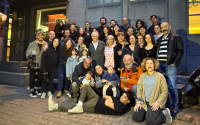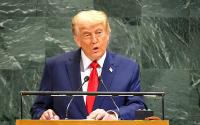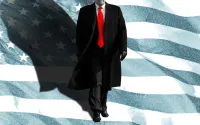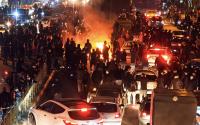Juan Gonzalez and Amy Goodman, Democracy Now!. Posted June 8, 2004
Editor's Note: This is excerpted from the transcript of a June 4 interview of Gore Vidal by Amy Goodman and Juan Gonzalez. Gore Vidal's newest book is 'Imperial America: Reflections on the United States of Amnesia,' published by Nation Books, an imprint of Avalon Publishing Group.
 Gore Vidal is a national icon. He is the author of more than 20 novels and five plays. He is one of the best-known chroniclers of American history and politics and his works have been translated into dozens of languages across the globe. He once told a magazine interviewer, "There is not one human problem that could not be solved... if people would simply do as I advise." And for more than a half a century, he has done just that.
Gore Vidal is a national icon. He is the author of more than 20 novels and five plays. He is one of the best-known chroniclers of American history and politics and his works have been translated into dozens of languages across the globe. He once told a magazine interviewer, "There is not one human problem that could not be solved... if people would simply do as I advise." And for more than a half a century, he has done just that.
He published his first novel, Williwawa, in 1946 at the age of 21. He began writing poems and stories as a young teenager and began his first novel while he was still in high school. His grandfather was a senator and his father worked for the Roosevelt administration. But rather than pursuing a family career of politics and privilege, Gore Vidal dedicated himself to writing and critiquing the injustices of American society. Following the publication of the first two of his latest trilogy of books examining the American empire, Vidal was described as the last "noble defender" of the American republic, America's last "small-r" republican. The recently published Imperial America: Reflections on the United States of Amnesia is the third and final book of the trilogy.
Amy Goodman: In his latest book, Gore Vidal writes that "not since the 1846 attack on Mexico in order to seize California has an American government been so nakedly predatory." He describes the current president as being like a man in one of those dreams who knows he's safe in bed and so can commit any crime he likes in his voluptuous dream. No one can stop him. Gore Vidal joins us now in our Firehouse Studio here in Chinatown, Downtown Community Television. Welcome to Democracy Now!.
Gore Vidal: Thank you. This is probably my first encounter in the United States with democracy. And I've lived a long time. Here we are in Chinatown, in the firehouse, and I feel free. But we're supposed to in a democracy.
Amy Goodman: Well, we welcome you.
Gore Vidal: Thank you.
Amy Goodman: Why use the word, "imperial," in your title, Imperial America?
Gore Vidal: Because everyone hates it so much. I remember years ago, Time magazine, in one of its numerous attacks on me, on my first book of essays, which was heaven knows when, 30, 40 years ago, I refer to the American empire and things that we were doing that were not very good across the world, and I referred to the empire. And Time magazine dismissed me. It was an awful review. I pointed out that we had troops and so on in over 1,000 other places around the world. That seems imperial to me, but there we are. Ever since then, I have loved the word, because it just drives them crazy.
But we are a world empire, hated by all, and not to mention the least, our own people, since we don't have any money left for anything. So, you started to go somewhere and I had written about Bush that he's like a kind of crazy kid in a dream, and he thinks he's invulnerable, and he's marching along through a dry forest, and he's lighting matches, dropping them, watching the fires, dropping another one. I had always assumed, like all good Americans, that he was a hypocrite, particularly on religious matters. Suddenly, it began to hit me, he may be another Reagan. He may really believe these are the end of times. What difference does it make? The world's going to end anyway. Why save the environment? Save it for what, you know? We're all going to be upstairs as sunbeams for Jesus. If he's one of those--well, those of us who can afford it will emigrate, and the others will be with Jesus in a higher sphere.
Juan Gonzalez: You talk about President Bush throwing matches or lighting matches in the forest. Your book, I thought, some of the most powerful parts were when you go into all of the outright lies of the Bush administration, and you spend quite a bit of time on his Healthy Forest Initiative and his response to wildfires. Can you expound a little bit on this?
Gore Vidal: Well, part of imperial America is just sort of a list of the lies that he has told us, and there's a special law against people who lie to the American people, whether they're in the Legislative Branch of the government, Judiciary or the Executive, like the president. He has now told so many lies that he knew to be lies, and that we know to be lies about everything that he can be on, I think it's 12 counts -- he can be impeached immediately, without much fuss, if you had a majority of people who wanted to impeach him in the House of Representatives. Then we go on trial in the senate as poor Bill Clinton found when he lied about sex, which in my day that is what gentlemen were supposed to do.
Amy Goodman: Let's hear President Bush, just in the last few days, giving the graduation address at the Air Force Academy in Colorado Springs.
President George W. Bush: In 1944, General Eisenhower sat down at his headquarters in the English countryside and wrote out a message to the troops who would soon invade Normandy. "Soldiers, sailors and airmen of the Allied Expeditionary Force," he wrote, "The eyes of the world are upon you. The hopes and prayers of liberty loving people everywhere march with you." Each of you receiving a commission today in the United States military will also carry the hopes of free people everywhere. As your generation assumes its own duties during a global conflict that will define your careers, you will be called upon to take brave action and serve with honor. In some ways, this struggle we're in is unique. In other ways it resembles the great clashes of the last century between those who put their trust in tyrants, and those who put their trust in liberty. Our goal, the goal of this generation, is the same. We will secure our nation and defend the peace through the forward march of freedom.
Amy Goodman: President Bush speaking at the Air Force Academy in Colorado Springs. President Bush comparing the conflict in Iraq to World War II. Today he's headed to Normandy. He just met with the Pope this morning on the anniversary of D-day. Your response, Gore Vidal?
Gore Vidal: Well, I'd like to be a fly on that wall where he meets the Pope, who highly disapproves of our imperial mission around the world. The Pope, although he's generally interested in sex only, (that is part of the Roman Catholic doctrine of power over the individual) the Pope is a good guy on matters of war and peace. He doesn't like war, and he doesn't like Bush. He doesn't like the United States at this moment. So, I would think that was a very chilling meeting between the two of them. It was chilly when Ronald Reagan went to see him, but Reagan went to sleep, and it was a wonderful meeting, you know. The pope said a few prayers, and there was Ron, snoring softly, and everybody was saying in a very - "it's been a very long trip, you know, from America here." And there's Reagan, sound asleep in front of all of the cameras. But to compare the preemptive wars of Mr. Bush, which are totally illegal, which offend -- if I may paraphrase Thomas Jefferson -- the decent opinion of mankind. The entire world is horrified by what we do. He goes into an innocent country called Afghanistan, knocks it down. One of his cabinet members knocks it down. Then he gives contracts to rebuild it to his vice president with Halliburton. Then he knocks down another country which has done nothing to us.
Juan Gonzalez: One of the big sections in your book is a privatizing of the American elections. Many people have almost forgotten Florida already, but we're now in a new year, a new election year, and already as we reported earlier on the show, CNN has sued the state of Florida to try to get the list of the newest list of felons about to be purged from the rolls in Florida. You have a lot to say about what will -- what could possibly happen with these elections, and what we, the nation, still have not dealt with about the last election?
Gore Vidal: Well, the sinister thing -- or certainly a sinister thing has been the privatizing of the elections, outsourcing, to use the latest catch phrase, is that for some time now people have been dissatisfied with the dangling chads and so on. There's a special act of Congress calling for a lot of money to be spent in order to bring up to date the voting machinery. It's touch screen stuff. It's supposed to be very popular with the voters. Well, it's the most easily corrupted of all, because you touch the screen, and you vote for Kerry, and then your vote suddenly is transformed almost immediately, and there's no track of it ever registering anywhere but in the hearts of heaven.
I go into great detail in the course of Imperial America into how three companies have absolutely got hold of the voting machinery, and Diebold, is the number one, and in the state of California where I am living, at least the California legislature backed them up and said in Orange County, which is one of the largest counties in L.A. during the recall election, recently something like 7,000 votes -- nobody can track them. There is no record that you voted. They call it a paper trail.
The head of Diebold, which is the number one manufacturer of these machines, is on record as saying he's a working Republican, and he's already written a fundraising letter to the voters of Ohio, which is a swing state, saying, well, I'll do everything I can to make sure that Ohio votes for President Bush. Well, noble partisanship and we're a free country. You can work for anybody who you want to, but don't make the machines, and don't make them unaccountable.
Absolutely it's difficult to find what goes on in these machines. So, in California, the legislature has already asked them to re-examine, and perhaps get rid of them, but you see, I mean, November is almost here. They're all over Georgia. They're all over Maryland. You could well lose the election if you had friends in high places with the three companies that produced these machines. You can change the election. Everybody could vote for Kerry, and suddenly, there is Bush once again, an unelected President, but serving his time and quacking away. You know, as though he were the real thing. Wartime President. I'm a wartime President.
Why, if we had any media in the country that was honest, and we don't, somebody would have pointed out this is not wartime. You cannot have a war without a declaration. Article two of the Constitution of the United States declaring war, and that should be the House of Representatives. That is the law of the land. He said, "I'm a wartime President." well, good for him, but he isn't. There's no war except what he has declared. That's on Afghanistan and what he has declared on Iraq. There is no war, and why they don't stop him right there. I'd switch him right off the air. I would have the voice going, President Bush is under a misapprehension that we are at war. We are not at war. He is at war.
I spent three years in World War II. I never heard President Roosevelt say -- "I'm going to send troops to China. And I will then send them to Southeast Asia." President Roosevelt never said "I." We. We are the United States. We will do this. All together with our allies. We will do this. So, it's "I." I'm going to do this. I'm going to do that. How a fool like this can be tolerated in a country whose median I.Q. cannot be much lower than that of Inner Slovenia, that they allow him to say ridiculous things and get away with it. I have never felt the country is so naked as it is now. There is no official voice. There is no representative government. Congress doesn't represent anybody. And the Supreme Court, I must say, why some of them are not in jail, I don't know. But be that as it may, to strike a happy note -
Amy Goodman: What can people do now? You have described grave problems. Elections being stolen. A war not declared, but engaged in.
Gore Vidal: I should think if there were a great and eloquent voice opposite to that of Bush -- in other words, if Kerry could only take off and start to say the things that I have been saying somewhat light heartedly, if he could say them a bit more heavy heartedly, then would you have an opposition and then would you have a big turnout. You might have a real vote going on. It wasn't until I watched, to my amazement, my cousin Albert Gore give that wonderful speech up at N.Y.U. was it? He sounded -- you know, the Gore blood. I'm making no pun, but the Gore blood was at last rippling.
Suddenly, there he is up there at N.Y.U. And he sounds like a President we didn't get. I mean, he was elected President, and I think this bothers George W. Bush every day, if somebody told you about it. I have a funny feeling that he doesn't know that he lost the election. Because he sounds so confident. I think he thought he was elected by a landslide, you know. Anything he wants to do, he can do. Because I'm a wartime President.
Amy Goodman: The 9/11 commission report?
Gore Vidal: Well, the 9/11, I haven't heard any final -- there's no final report yet.
Amy Goodman: No, no. There isn't. But in terms of the kind of investigation that we have seen.
Gore Vidal: I'm astonished that they allowed anything, and then I was not in the least surprised that urgent questions were not really asked or answered. I mean, it's better than nothing. I mean, you know, we only get a tiny bone of democracy. I can say that on this program, which is dedicated to democracy. Incidentally, for your listeners, viewers, the word "democracy" is not only never mentioned in the Constitution of the United States, but democracy was something that the founding fathers hated. This is not generally known because it shouldn't be known, but it is. I wrote a little book about it called, "Inventing A Nation," that Yale published last year. Our founders feared two things. One was the rule of the people, which they thought would just be a mess. And they feared tyranny, which we had gone through King George III, and so they wanted a republic, a safe place for men -- white men of property to do business in. This is not ideal, but it's better than what we have.
So, here we are bringing democracy to the poor Afghans, but only real democracy, of course, is in the prisons, which we have specialized in everywhere. One interesting thing that came out of all of that mess was now the world knows how we treat Americans in American prisons. All of that behavior, the humiliation and violence and so on, that is typical of not so much -- of federal prisons somewhat, but state prisons, municipal prisons, detention centers. This is the nation of torture, and those who disagree with me, you can write an angry letter at this very moment, if you can write at all. Sit down and write an angry letter to the Commander In Chief. Have him examine the prisons.
Amy Goodman: Well, on that note, I want to thank you very much for being with us, Gore Vidal.
Gore Vidal: I just barely started. [laughs]
Amy Goodman is the host of the nationally syndicated radio news program Democracy Now.






